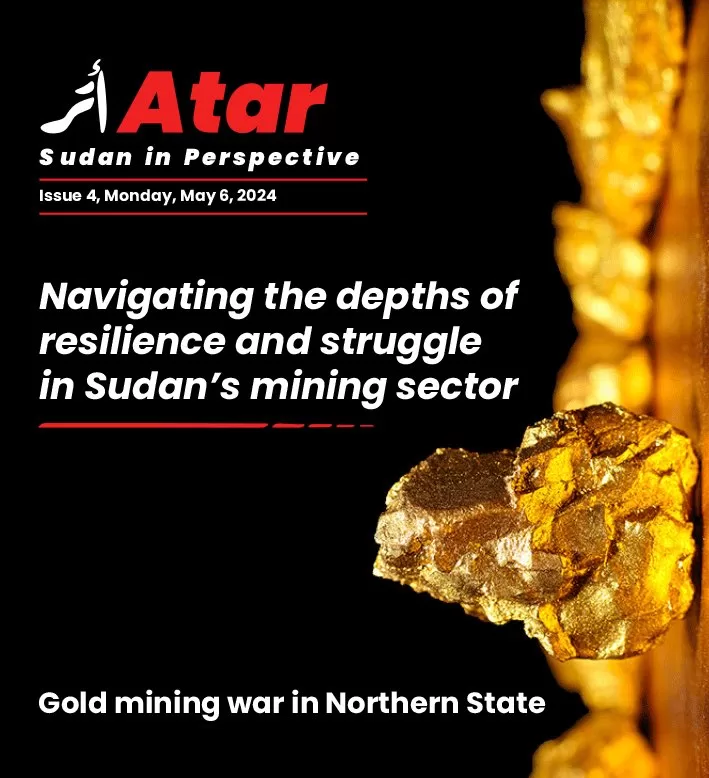Atar, a digital magazine distributed via email and WhatsApp, first came to my attention late last October. I was in a dimly lit New York cafe, warmed by the company of a group of Sudanese diaspora; artists, activists, journalists, nursing hot teas and wounded souls. As it often does, the question of obtaining high quality Sudani news bubbled up. “Have you heard about Atar yet?’ someone asked. I hadn’t, yet. But this interaction was instructive. With their formal website still under construction, word-of-mouth was one of the main ways this weekly Arabic (bi-monthly English) magazine was being found.
An initiative of the non-for-profit Sudan Facts Center for Journalism Services – founded by veteran journalist Arif Elsaui – Atar began publishing on 12 October 2023, six months into the war against civilians in Sudan. Co-managing director Amar Jamal told Index it was a project borne of necessity.
“We had been talking about theory for a long time,” Jamal said. “But with the current situation, we realised there won’t be any more media outlets in Sudan left.”
Sudan Facts Center had been running fellowships for young professional journalists, but the crisis spurred them into pushing forward with their greater ambitions. “If we were going to wait until the perfect conditions, we would be waiting a long time. Let us start, and improve as we go along,” Jamal noted.
Since October, the Atar team has produced 28 Arabic editions and four in English. Inspired by The Continent, another popular African digital news magazine, Atar – with the tagline “Sudan in Perspective” – is currently distributed through Telegram, WhatsApp, Signal and email.
“There hasn’t been a day when our distribution list hasn’t grown,” Jamal said.
Stories range from investigations into “Sudan’s labyrinth of torture centres” to the stories of those fleeing the war north through Egypt. Early editions reported on the daily experiences of Sudanese people during the conflict, how they “eat, drink and sleep” and their “daily heroism”, while more recent releases focus on the mutual aid infrastructure keeping people alive.
Not only was the content of the story important to get right, Jamal said, but the voice and tone of the publication was given thorough consideration.
“We stay away from tragic language. While we are writing about death, we write about it with heroism.” Not necessarily out of a desire to give readers hope, “but to give people an encouraging word”.
Atar began with three editors in Nairobi – Arif Elsaui, Amar Jamal and Mohammed Alsadiq – and four correspondents. The first releases were focused on the written word, delivering vital information via dense blocks of text, not unlike the traditional Sudanese newspaper. But this model changed after the team took stock 10 weeks into the project. Over the new year period, “we took a break to review the structure and design, expand our pool of reporters, institutionalise the project so it wouldn’t fail,” Amar said.
Today, Atar is delivered by 24 reporters and seven editors. The growth is palpable, not only in the range of stories, but in their design. The structure and voice of Atar is unique, deliberately so. “This is not a newspaper, delivering daily stories,” Amar makes clear. Atar is focused on analysis, curation, about showing the verification and the context for your average reader to make sense of unfolding events.
“The need for a newspaper has changed in the age of social media,” said Jamal, noting that in an age of camera phones, the recording of events has been democratised.
“What is needed now is the verification and context. That is our ambition. Respecting the intellect of the Sudanese reader, and presenting material that yes, might be difficult, but it has value. The value it has is in its truth.”
Atar is providing a home for fact-based news in a prohibitive information landscape. There are few players in Sudan today, fewer still after the state suspended operations of three satellite channels this April, Saudi state-owned broadcasters Al Arabiya and Al Hadath and UAE-owned Sky News Arabia.
“All of the correspondents that we began with have had to leave the country,” Amar admitted. “It’s very difficult to write from the inside.” But difficult is not impossible, and Atar consistently manages to publish original stories from the ground.
“Sometimes, stories are written under the Atar byline to protect the journalist,” Jamal said, describing how their local correspondents find ways to contact sources and file stories even in the most challenging circumstances. “Even when the internet was cut off,” he said. “You just adjust your investigative style.”
Atar’s popularity now means that they are regularly approached by writers, reporters and potential sources as an outlet for news, with some sending in fully written pieces for publication. Atar pride themselves on having an open-door policy, allowing anyone to submit material via phone or email, but only work that goes through their fact-checking system will be included in the magazine. The volume of engagement and interest is a “scream from the people,” Jamal said. Even a 14-year-old girl sent a piece with some news. These are people’s voices who are not heard and Atar wants to be a home for them.
Such grounded local reporting cultivates intense loyalty and support, such as in the case of the small island of Dagarti. “It has maybe only 300, 400 inhabitants,” Jamal said. “Nobody had written about these people before. But when our journalist went to do a follow-up story, she said the whole island waits for Thursday so they can read Atar.”
What next for Atar? The team has big ambitions. Their English-language edition was always part of the plan, because “it isn’t just the Sudanese reader that cares about Sudan.” They have recently moved into a new, larger office in Nairobi, with talk of a live studio arm, events and more. Their approach is experimental, and with enough funding in the bank for the moment, Jamal is excited about the future.
Jamal is not the only one. If this is what the Sudanese people can do in the most inhospitable of circumstances, imagine the possibilities once the war is over.






